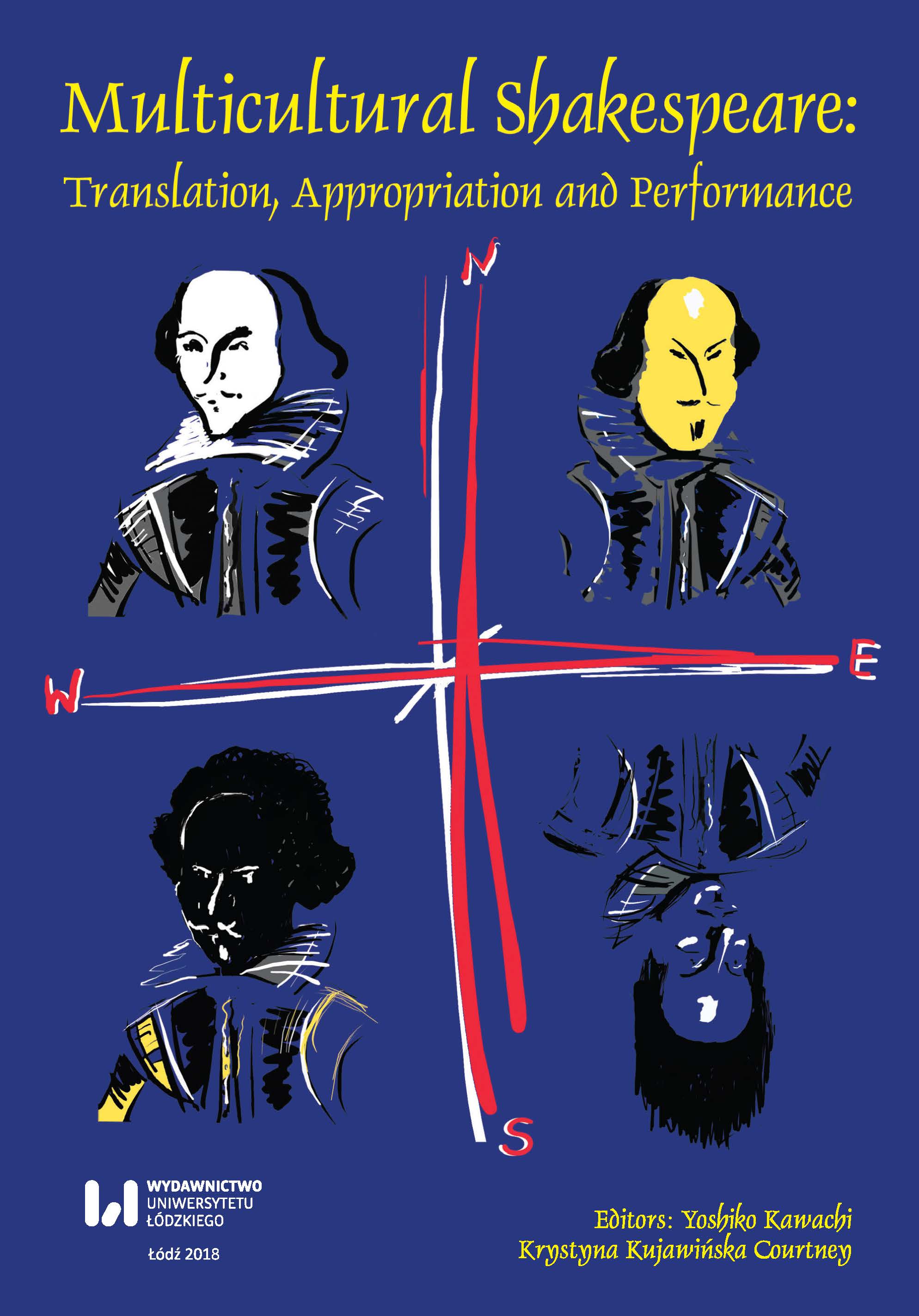Shakespeare in Hawai‘i: Puritans, Missionaries, and Language Trouble in James Grant Benton’s "Twelf Nite O Wateva!", a Hawaiian Pidgin Translation of "Twelfth Night"
DOI:
https://doi.org/10.18778/2083-8530.18.05Keywords:
Twelfth Night, Reformation studies, puritanism, pidgin and creole languagesAbstract
In 1974, the Honolulu-based director James Grant Benton wrote and staged Twelf Nite O Wateva!, a Hawaiian pidgin translation of Shakespeare’s Twelfth Night. In Benton’s translation, Malolio (Malvolio) strives to overcome his reliance on pidgin English in his efforts to ascend the Islands’ class hierarchy. In doing so, Malolio alters his native pidgin in order to sound more haole (white). Using historical models of Protestant identity and Shakespeare’s original text, Benton explores the relationship between pidgin language and social privilege in contemporary Hawai‘i. In the first part of this essay, I argue that Benton characterizes Malolio’s social aspirations against two historical moments of religious conflict and struggle: post-Reformation England and post-contact Hawai‘i. In particular, I show that Benton aligns historical caricatures of early modern puritans with cultural views of Protestant missionaries from New England who arrived in Hawai‘i beginning in the 1820s. In the essay’s second part, I demonstrate that Benton crafts Malolio’s pretentious pidgin by modeling it on Shakespeare’s own language. During his most ostentatious outbursts, Malolio’s lines consist of phrases extracted nearly verbatim from Shakespeare’s original play. In Twelf Nite, Shakespeare’s language becomes a model for speech that is inauthentic, affected, and above all, haole.
Downloads
References
Ardolino, Frank R. “Review of “Twelf Nite O’ Wateva!,”” Shakespeare Bulletin 13.3. (1995): 22-4.
Google Scholar
Benton, James Grant. “Twelf Nite O Wateva!” Kumu Kahua Plays. Ed. Dennis Carroll. Honolulu: U of Hawaii Press, 1983. 185-238.
Google Scholar
Bevington, David. Introduction. “Twelfth Night, or What You Will.” The Complete Works of Shakespeare. New York: Harper Collins Publishers, 1992. 326-9.
Google Scholar
Carroll, Dennis. Editor’s Note. “Twelf Nite O Wateva!” Kumu Kahua Plays. Ed. Dennis Carroll. Honolulu: U of Hawaii Press, 1983. 185.
Google Scholar
Carroll, Dennis and Elsa Carroll. “Hawaiian Pidgin Theatre.” Educational Theatre Journal 28.1 (1976): 56-68.
Google Scholar
Da Jesus Book. Orlando: Wycliffe Bible Translators, 2000.
Google Scholar
“Hawaiian Creole English,” Ethnologue: The Languages of the World, 18th edition, 2015. http://www.ethnologue.com/18/language/hwc Accessed: October 9, 2017>.
Google Scholar
Foley, F. Katherine. “Theater Review: ‘Twelf Nite’ a New Twist on Shakespeare,” Los Angeles Times, May 31, 1995. http://articles.latimes.com/1995-05-31/entertainment/ca-7742_1_twelf-nite-o-wateva Accessed: October 27, 2017.
Google Scholar
Forrest, James F. “Malvolio and Puritan “Singularity,”” English Language Notes 11.4 (1973): 259-64.
Google Scholar
Haller, William. The Rise of Puritanism. 1938. New York: Columbia U Press, 1957.
Google Scholar
Hamilton, Donna B. Shakespeare and the Politics of Protestant England. New York: Harvester Wheatsheaf, 1992.
Google Scholar
Hearn, Richard. “All Things Considered.” September 2, 1990.
Google Scholar
Holden, William P. Anti-Puritan Satire: 1572-1642. New Haven: Yale U Press, 1954.
Google Scholar
Hooker, Richard. Of the Laws of Ecclesiastical Polity. 2 Vols. Ed. Christopher Morris. London: Dent, 1954.
Google Scholar
Hughes, Judith R. “The Demise of the English Standard School System in Hawai‘i,” The Hawaiian Journal of History 27 (1993): 65-89.
Google Scholar
Hunt, Maurice. “Malvolio, Viola, and the Question of Instrumentality: Defining Providence in “Twelfth Night,”” Studies in Philology 90.3 (1993): 277-97.
Google Scholar
Hunt, Maurice. Shakespeare’s Religious Allusiveness: Its Play and Tolerance. Aldershot, UK: Ashgate, 2004.
Google Scholar
Johnston, Douglas “Peppo” L. Pidgin to the Max. 1981. Honolulu: The Bess Press, 1986.
Google Scholar
Keane, Webb. Christian Moderns: Freedom and Fetish in the Mission Encounter. Berkeley: U of California Press. 2007.
Google Scholar
Keane, Webb. “Sincerity, “Modernity,” and the Protestants,” Cultural Anthropology 17.1 (2002): 65-92.
Google Scholar
Knapp, Jeffrey. Shakespeare’s Tribe: Church, Nation, and Theater in Renaissance England. Chicago: U of Chicago Press, 1992.
Google Scholar
Lippi-Green, Rosina. “Standard Language Ideology, and Discriminatory Pretext in the Courts,” Language in Society 23.2 (1994): 163-98.
Google Scholar
Myers, Aaron M. Representation and Misrepresentation of the Puritan in Elizabethan Drama. Folcroft, Pennsylvania: The Folcroft Press Inc., 1990.
Google Scholar
Reinecke, John E. ““Pidgin English” in Hawaii: A Local Study of the Sociology of Language,” American Journal of Sociology 43.5 (1938): 778-89.
Google Scholar
Sakoda, Kent and Jeff Siegel. Pidgin Grammar: An Introduction to the Creole Language of Hawai‘i. Honolulu: The Bess Press, 2003.
Google Scholar
Shakespeare, William. “Twelf Night, or What You Will.” The Norton Shakespeare. Eds. Stephen Greenblatt et al. New York: W.W. Norton & Co., 2016.
Google Scholar
Siegel, Paul N. “Malvolio: Comic Puritan Automaton.” Shakespearean Comedy. Ed. Maurice Hunt. New York Literary Forum 5-6 (1980): 217-30.
Google Scholar
Simmons, J.L. “A Source for Shakespeare’s Malvolio: The Elizabethan Controversy with the Puritans.” Huntington Library Quarterly 36.3 (1973): 181-201.
Google Scholar
Simpson, James. Burning to Read: English Fundamentalism and Its Reformation Opponents. Cambridge, MA: Harvard U Press, 2010.
Google Scholar
Wong, Alia. “De-Stigmatizing Hawaii’s Creole Language.” The Atlantic. November 20, 2015. https://www.theatlantic.com/education/archive/2015/11/hawaiian-pidginrecognized/416883 Accessed: October, 9, 2017.
Google Scholar
Downloads
Published
How to Cite
Issue
Section
License

This work is licensed under a Creative Commons Attribution-NonCommercial-NoDerivatives 4.0 International License.












